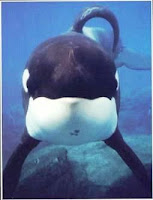“Whales” If they are our friends… shouldn’t we acknowledge their contribution to our well-being?
Whales are amazing creatures, and they have been immortalized by writers like Herman Melville with his classic Moby Dick, and most recently in the story about Keiko the star in the Free Willy Movie.
We have always been fascinated by whales; they are amazing beings, and we have been very lucky having the opportunity of seeing them and their calves, near to our boat while going fishing. “Who does not love the thrilling experience of seeing them very close and in person?” We think of them as our colossal friends.
 History has revealed there was a time when whales were an important part of the aborigine’s diet. For some indigenous groups like the Alaskan natives, they are still a key element of their livelihood. Somehow, over the years, whales began to play a significant role in the economic system. The whaling industry emerged in the 16th - 17th century due to the increasing need of goods and advances in technology. By the 18th and 19th century, whaling became a highly competitive business. Furthermore, in the beginning of the 20th century, the world saw the introduction of factory ships, created with the sole purpose of hunt, capture, and transport whales more effectively.
History has revealed there was a time when whales were an important part of the aborigine’s diet. For some indigenous groups like the Alaskan natives, they are still a key element of their livelihood. Somehow, over the years, whales began to play a significant role in the economic system. The whaling industry emerged in the 16th - 17th century due to the increasing need of goods and advances in technology. By the 18th and 19th century, whaling became a highly competitive business. Furthermore, in the beginning of the 20th century, the world saw the introduction of factory ships, created with the sole purpose of hunt, capture, and transport whales more effectively.
Of course, during that whaling era, many species became endangered. The huge reduction in their numbers caused all sorts of environmental changes, which have affected the earth eco-systems. Some of the consequences can be seen in the increased levels of carbon dioxide to global warming, in addition to the changes of feeding habits in many aquatic life forms due to the destabilized food chain.
Fortunately, in 1986 the International Whaling Commission banned the practice of commercial whaling in certain countries. http://iwcoffice.org
The IWC is an organization created to prevent the over-hunting of whales, and create policies as to how people are allowed to interact with whales.
Despite the efforts of several organizations, there are countries that are not part of any agreement to stop killing whales. Some of them are still, hunting them to this day. It is the reason why, many individuals and organized groups are playing catch up to protect as many endangered species as possible.
If we could grasp the magnitude of the great contribution whales make to our every-day life; we could consciously decide to think about being more responsible in our interaction with them.
I found four reasons why whales are important to our environment, and I think they are good reasons.
1. Whales play a huge role in stabilizing the aquatic food chain and reproduction of other species. For example, if a blue whale consumes as much as 40 million krill per day, what do you think would happen with the oceanic ecosystem if this type of whale was extinct, and no other specie would eat that much krill?
2. By studying whales, scientists have made great advances in issues like echolocation, marine biology, marine mammal intelligence, aquatic environments, etc.
3. Believe it, or not, whale poop, plays a huge role in stabilizing the carbon levels within the atmosphere by stimulating the growth of phytoplankton. This type of marine plant pulls carbon from the air, providing a healthier environment for both land and aquatic life form.
4. In many countries like Costa Rica, Whale Watching has become a very important source of tourism and income.
This type of activity often stimulates the country's economic growth. http://www.dolphintourcostarica.com/
Let see how many years a whale supposed to live if given the opportunity:
Humpbacks live about 125 years.
Gray whales live 30 to 60 years.
Blue whales live between 80 and 90 years.
Fin whales live about 85 years.
Minke whales 40 to 50 years
The Sperm whale lives about 75 years.
In general, most whales can live to be 50 if their environment is not altered.
I do not belong to any pro-whale organization; however, living in Uvita, Costa Rica, has given me more appreciation for these majestic mammals.
Marino Ballena National Park is one of the sanctuaries the humpback whales visit every year.
They come to have their babies, because the warm waters of our southern pacific coast are very nurturing to them.
We are fortunate to be in a place where these magnificent creatures come for their annual visit. That makes me realize, that if we all think of all the “Good” these animals bring to our lives, and the key role they play in our well-being, we might be willing to help them to reach their full maturity. These intelligent creatures are our friends! As long as we treat them with respect, they will continue making our world a balanced and happy place for all.








